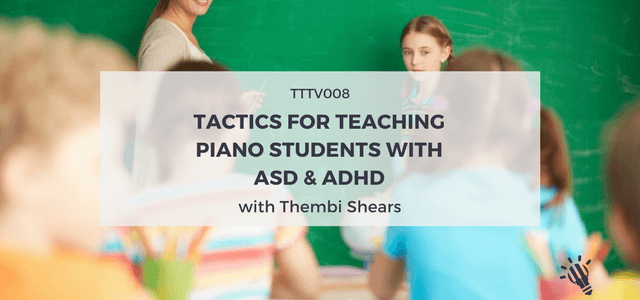
Have you ever taught a student with special needs or learning difficulties? Do you have a student right now who is on the Autism Spectrum?
In today’s podcast epidsode Thembi Shears shares her fantastic insights into teaching students with ASD or ADHD. Thembi talks about what these terms mean, the difficulties you may encounter, and how to teach these students in the most effective and sensitive way.
As piano teachers we are in the privileged position of getting to teach students one-on-one. Unlike classroom teachers who have to take one approach for lots of different children, we get to adapt our teaching to suit each child.
So when a student with different needs walks in the door, we need a teaching toolbox to draw from to help them learn in a way that suits them. Take a listen to today’s podcast and you’re sure to learn something new that you can implement right away, or keep in the memory bank for the next time a student with ASD or ADHD walks through your door!
Music Teachers’ Helper is the software solution I use for running my private studio. If you’re still trying to keep track of invoices, student details, tax records and book loans on spreadsheets or pieces of paper, you really are wasting your time.
Music Teacher’s Helper is online scheduling and billing software which you can access from any computer, phone or tablet, and that will literally save you hours every month in studio admin.
One of the coolest things about it is that you can automatically email lesson reminders to students or parents to reduce the chance of missed lessons, particularly if you work on a rotating timetable. You can even build a studio website for free right in the program and it comes with a companion practice app for students so you can see exactly how much they’ve practiced.
Of course there are heaps more features, but the best thing to do is head to www.musicteachershelper.com/tim, register for a risk-free 30 day trial and if you choose to continue your access, you’ll get 20% off your first month.
How did it go? Was there something Thembi mentioned that resonated with you, or a new idea you’re going to try?

